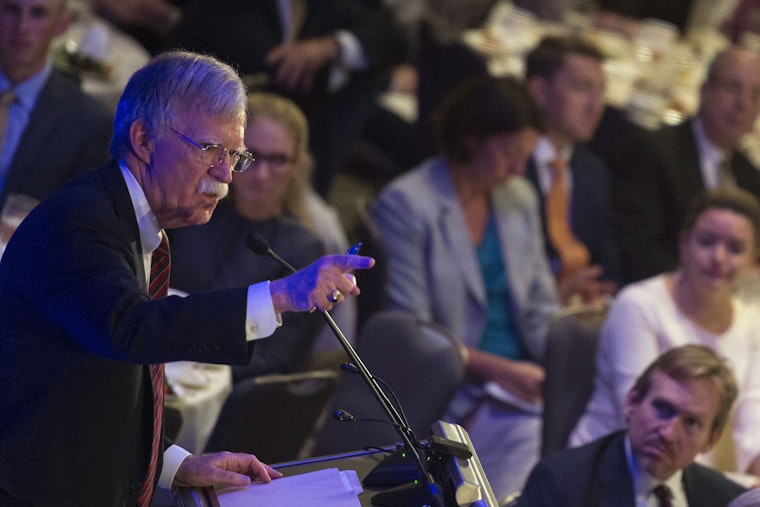Why John Bolton’s Diatribe against the International Criminal Court Is Misleading, Misguided, and Wrong
By James A. Goldston

John Bolton, the U.S. president’s national security adviser, launched an assault on the International Criminal Court (ICC) this week that was all Trump: untethered to facts, myopic in its view of U.S. national interest, and aimed at dismantling the international order.
Modeling his boss’s tweetstorms, Bolton has sown confusion and furor among ICC defenders through equal parts deception, exaggeration, and intimidation.
It’s important to separate fact from fiction in Bolton’s diatribe. Among the many misrepresentations, here are three of the biggest:
- First, Bolton wrongly portrays the ICC as a “free-wheeling global organization claiming jurisdiction over individuals without their consent.” This is plain nonsense. People rarely “consent” to being prosecuted for crimes they commit. But if you travel to another country and kill someone, guess what? You will be held to account even though you had no say in making the law or selecting the judge.
- Second, Bolton’s complaint that the ICC is “unaccountable” similarly flies in the face of reality. The ICC operates under the terms of a painstakingly negotiated instrument which sets forth meticulous definitions of criminal conduct as well as numerous stages of legal processes. The entire enterprise has been ratified by more than 120 governments—every one of them determined to yield no more power to an international tribunal than necessary. If anything, the ICC is accountable to too many actors—which is one of the factors limiting its global impact (of which Bolton is so scornful).
- Third, Bolton egregiously asserts that the ICC is “superfluous,” because the U.S. judicial system already holds American citizens to the highest legal and ethical standards and “takes appropriate and swift action to hold perpetrators accountable.” If only that were so. My organization represents two individuals whom, according to the European Court of Human Rights, were tortured, forcibly disappeared, and kept hidden by the CIA from the outside world for months at a time. To this date, no U.S. official has been prosecuted for these or the many other abuses perpetrated as part of the George W. Bush administration’s war on terror. U.S. courts have repeatedly declined to entertain these cases on the merits.
In short, Bolton’s crude declaration of war on the ICC is founded on falsehoods. Even more worrisome, it embodies the worst of the Trump administration’s contempt for the rule of law.
For the ICC is not just a court. It’s also the cornerstone of a worldwide movement—animated by a fundamental principle that undergirds the U.S. Constitution—that no one is above the law. It’s a product of history; of the memory of how wrong things can go when national sovereignty is taken to an extreme and demagogic leaders pit one group against another.
And despite its imperfections, the ICC is the institutional expression of a decadeslong ambition to ensure that when powerful leaders cross the line from politics to grave criminality, they will be tried and punished—fairly, and in a manner that reaffirms the global community’s collective will to do better.
So when the ICC’s watchful eye prompts Colombia’s drug lords to end a half-century-long civil war in America’s backyard, as they did in 2016, for example, that’s a win not only for Colombia’s people but also for the United States.
And when the ICC’s example sparks national prosecutors in Germany, Sweden, and other countries to bring war crimes charges against terrorist fighters and officials from Syria’s murderous regime, that’s a win not only for the hundreds of thousands killed since 2011 but also for the United States.
And when, notwithstanding similar UN blockage, a chamber of ICC judges asserts legal jurisdiction over the forced deportation of Rohingya, as was recently done, that’s a win not only for the long-suffering victims but also for the United States—which has both strategic and moral reasons to defend Muslims from persecution.
Simply put, while the ICC may be “dead” to John Bolton, the human aspiration for basic justice is alive and kicking—in the United States and around the world. Blind opposition to a foreign court may excite President Trump’s political base, but it undercuts U.S. interests and ignores some of the United States’ most cherished principles.

James A. Goldston is the executive director of the Open Society Justice Initiative.